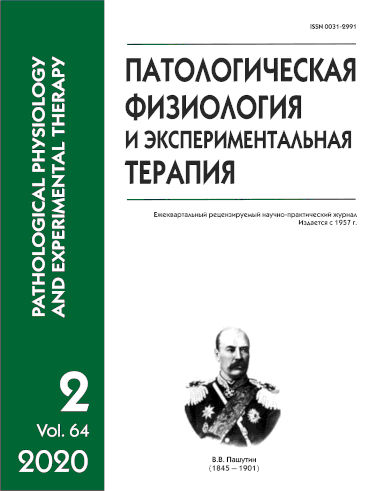Transcription factors HIF-1 α and NF-kB of tumor tissue and ascites cells in advanced ovarian cancer
Abstract
Introduction. NF-kB belongs to endogenous promoters involved in tumor-associated inflammation. Like HIF-1α, NF-kB can also be activated in response to hypoxia. In this case, cross-talks and compensatory pathways can link the NF-kB and HIF-1α systems. The aim of this study was to evaluate the expression of transcription factors HIF-1α and NF-kB in primary tumor tissue and ascites tumor cells and their correlation with sensitivity to platinum-containing chemotherapy (CT) in patients with advanced ovarian cancer (OC). Methods. Samples of ascitic fluid were obtained from 20 patients with first diagnosed and verified stage T3NX-1M0 and T3NX-1M1 ascitic serous OC immediately after diagnosis, and epithelial cells were isolated from the ascitic fluid. Samples of tumor tissue and histologically normal ovarian tissue were also obtained from patients intraoperatively. Contents of HIF-1α and NF-kB were measured using enzyme immunoassay (eBioscience, USA and CloudClone Corp., USA) in all samples. Nuclear extracts for measuring HIF-1α and NF-kB were prepared according to the manufacturer’s instructions. Expression of transcription factors, their correlation, and prognostic significance for relapse-free survival were determined depending on the tumor spread. Results. The content of HIF-1α was 12 times higher in the ovarian tumor tissue (p <0.05) and 3.1 times higher in ascitic fluid (p <0.05) than in histologically normal tissue; the content of NF-kB was increased 6.5 times in the tumor tissue (p ≤ 0.05) and 2.2 times in ascitic fluid (p ≤0.05). The expression of both factors was reduced in histologically normal ovarian tissue from patients with the T3NX-1M1 stage compared to patients with the T3NX-1M0 stage. A strong positive correlation was observed for contents of HIF-1α and NF-kB in both tumor and histologically unchanged tissue from patients with the T3NX-1M0 stage and in ascites cells from patients with the T3NX-1M1 stage. It was established that high levels of HIF-1α and NF-kB expression in tumor tissue dramatically reduced duration of the relapsefree period. Conclusion. The study results suggest activation of major signaling pathways for tumor-associated inflammatory reactions in T3NX-1M0 stage OC.






